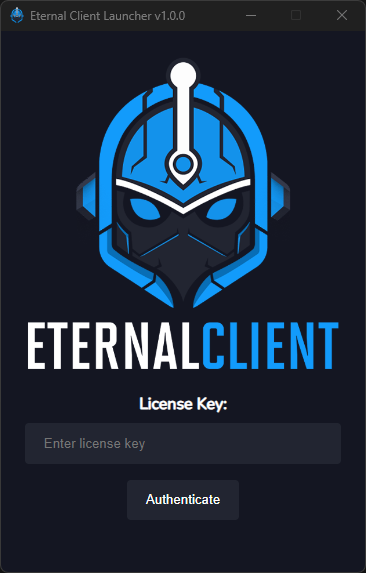Using EternalClient
Here you will find information on how to use EternalClient.
To use EternalClient, you must have an active client subscription. If you do not have one, you can log in on the website using Discord and purchase one.
Installation
Currently, EternalClient is only downloadable through our Discord server, and you need an active client subscription.
- Windows
- Linux
- macOS
Once the launcher is downloaded, proceed to run the application. Upon launch, an authentication screen will appear, where you'll be required to enter your license key.
Once the launcher binary is downloaded, you will need to make it executable by right clicking on it or use the following command:
chmod +x FILENAME
Once the launcher is executable, proceed to run the application. Upon launch, an authentication screen will appear, where you'll be required to enter your license key.
On macOS the authentication screen will not appear, and you'll be required to launch the application with the --licenseKey argument.
Once the launcher binary is downloaded, you will need to make it executable by right clicking on it or use the following command:
chmod +x FILENAME
Once the launcher is executable, proceed to run the following command to launch the application with CLI arguments:
FILENAME --licenseKey YOUR-LICENSE-KEY

You can find your license key on your account page or use the command /info on our discord server.
The launcher will then start to download all the dependencies and launch the client, this process can take some time depending on your internet connection.
That's it, you are now ready to use EternalClient!
CLI Launch Arguments
You can use the following launch arguments to customize your experience.
| Argument | Description |
|---|---|
--payload | Path to json or yaml payload file |
--channel | The update release channel (stable / dev) |
--licenseKey | Client license key, skips authentication screen |
--proxy | SOCKS5 or HTTP proxy information (host:port:user:pass or host:port) |
--script | Name of the script to start upon launch |
--scriptParams | Parameters that will be provided to the onStart method when starting the script |
--world | Startup World, Specific: 380, Random: (f2p / p2p / low_pop_f2p / high_pop_p2p), default: f2p |
--accountUsername | The game account username |
--accountPassword | The game account password |
--otpKey | The game account otp key (e.g. google authenticator) |
--pin | The game account bank pin (4 digits) |
--accountType | The game account type (rs / jagex) (default "rs") |
--jagexCharacterID | The jagex character id |
--jagexSessionID | The jagex session id |
--imap | The imap account information (address:port:user:pass:ssl) |
--minimize | Automatically minimize the client after launch |
--fps | the maximum allowed fps for the game client's graphic rendering (between 1-50), default: 50 |
--memory | The maximum amount of heap memory to allocate to the JVM (in megabytes), default: 512 |
--rebootOnCrash | If a game crash would occur it will reboot the client with the same arguments |
--neverLogout | Makes it so that your character will never log out due to inactivity |
--disableLogging | Disable writing stdout / stderr to log files |
--disableRendering | Disable client rendering upon launch |
- Windows
- Linux
- macOS
Minimal Usage Example:
EternalClient.exe --licenseKey YOUR-LICENSE-KEY
Minimal Usage Example (JSON Payload):
EternalClient.exe --payload test.json
{
"licenseKey": "YOUR-LICENSE-KEY"
}
Minimal Usage Example (YAML Payload):
EternalClient.exe --payload test.yml
licenseKey: 'YOUR-LICENSE-KEY'
JSON & YAML payload files support all cli flags (with the exact same name and variable type) other than "help" and "payload"
Low Resource Usage Example:
EternalClient.exe --licenseKey YOUR-LICENSE-KEY --fps 3 --disableRendering
Minimal Usage Example:
EternalClient --licenseKey YOUR-LICENSE-KEY
Minimal Usage Example (JSON Payload):
EternalClient --payload test.json
{
"licenseKey": "YOUR-LICENSE-KEY"
}
Minimal Usage Example (YAML Payload):
EternalClient --payload test.yml
licenseKey: 'YOUR-LICENSE-KEY'
JSON & YAML payload files support all cli flags (with the exact same name and variable type) other than "help" and "payload"
Low Resource Usage Example:
EternalClient --licenseKey YOUR-LICENSE-KEY --fps 3 --disableRendering
Minimal Usage Example:
EternalClient --licenseKey YOUR-LICENSE-KEY
Minimal Usage Example (JSON Payload):
EternalClient --payload test.json
{
"licenseKey": "YOUR-LICENSE-KEY"
}
Minimal Usage Example (YAML Payload):
EternalClient --payload test.yml
licenseKey: 'YOUR-LICENSE-KEY'
JSON & YAML payload files support all cli flags (with the exact same name and variable type) other than "help" and "payload"
Low Resource Usage Example:
EternalClient --licenseKey YOUR-LICENSE-KEY --fps 3 --disableRendering